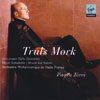Bloch; Bruch; Schumann Works for Cello & Orchestra
Compelling readings with a fine cellist particularly powerful in the Bloch
View record and artist detailsRecord and Artist Details
Composer or Director: Max Bruch, Robert Schumann, Ernest Bloch
Genre:
Orchestral
Label: Virgin Classics
Magazine Review Date: 6/2005
Media Format: CD or Download
Media Runtime: 59
Mastering:
Stereo
DDD
Catalogue Number: 545664-2

Tracks:
| Composition | Artist Credit |
|---|---|
| Concerto for Cello and Orchestra |
Robert Schumann, Composer
French Radio Philharmonic Orchestra Paavo Järvi, Conductor Robert Schumann, Composer Truls Mørk, Cello |
| Kol Nidrei |
Max Bruch, Composer
French Radio Philharmonic Orchestra Max Bruch, Composer Paavo Järvi, Conductor Truls Mørk, Cello |
| Schelomo |
Ernest Bloch, Composer
Ernest Bloch, Composer French Radio Philharmonic Orchestra Paavo Järvi, Conductor Truls Mørk, Cello |
Author: Edward Greenfield
The outstanding performance in this collection of concertante cello works is of Bloch’s Schelomo, which comes as a rich and satisfying climax. Not since the classic first recording – Emanuel Feuermann with Stokowski and the Philadelphia Orchestra (now on Biddulph, 12/91) – do I remember a performance so concentrated and powerful. The solo rhapsodising suits Truls Mørk’s expressive style perfectly, and Paavo Järvi draws from the French Radio Philharmonic a performance of wonderful weight and clarity. The climax of the first big tutti (track 5, 7’00”) has a thrust that makes Bernstein’s accompaniment for Rostropovich seem relatively lightweight. So, too, with the tutti towards the end, with Mørk pressing ahead in the lead-up to it. Though Rostropovich sounds weightier, Mørk’s concentration and the clarity of sound heighten the impact of his playing.
There is similar concentration in the rhapsodic Kol nidrei of Bruch, with Mørk’s pianissimo playing magically refined. The reading of the Schumann, though comparably warm, is more controversial; his flexible phrasing leads him to vary the beat far more than either Rostropovich or Jacqueline du Pré, among the most expressive soloists of all yet who keep far steadier tempi. Mørk’s freedom goes with a sense of fantasy, and in the brisk finale, with rhythms lightly sprung, there is less room for him to pull the tempo around.
In Schelomo, Järvi draws playing of admirable clarity from the orchestra, but in the Schumann the sound is congested at times and the playing less incisive. Though I prefer the alternative versions, this is still compelling, well-coupled with outstanding performances of the Bloch and Bruch.
There is similar concentration in the rhapsodic Kol nidrei of Bruch, with Mørk’s pianissimo playing magically refined. The reading of the Schumann, though comparably warm, is more controversial; his flexible phrasing leads him to vary the beat far more than either Rostropovich or Jacqueline du Pré, among the most expressive soloists of all yet who keep far steadier tempi. Mørk’s freedom goes with a sense of fantasy, and in the brisk finale, with rhythms lightly sprung, there is less room for him to pull the tempo around.
In Schelomo, Järvi draws playing of admirable clarity from the orchestra, but in the Schumann the sound is congested at times and the playing less incisive. Though I prefer the alternative versions, this is still compelling, well-coupled with outstanding performances of the Bloch and Bruch.
Discover the world's largest classical music catalogue with Presto Music.

Gramophone Digital Club
- Digital Edition
- Digital Archive
- Reviews Database
- Full website access
From £8.75 / month
Subscribe
Gramophone Full Club
- Print Edition
- Digital Edition
- Digital Archive
- Reviews Database
- Full website access
From £11.00 / month
Subscribe
If you are a library, university or other organisation that would be interested in an institutional subscription to Gramophone please click here for further information.




